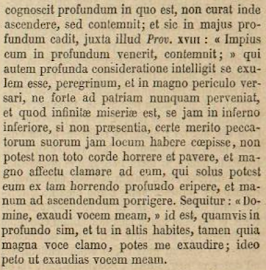Today, we begin a new series of posts featuring St Robert Bellarmine's commentary on Psalm 129, the sixth of the Seven Penitential Psalms.
The Latin is reproduced courtesy of the Digital Collection site - UANL and is accompanied by my fairly literal translation. The Scripture excerpts (Douay Rheims/Vulgate) are taken from the DRBO site but the verse numbering follows that of Bellarmine’s Latin text.
Where footnotes are included, the text follows each section.
Cant
Canticum Graduum Salomonis
A gradual canticle of Solomon.[1]
This Psalm is short but filled with most salutary teaching. Not without cause is it used in the Church for reasons, apart from any others, such as the following: one comes from the gradual Psalms, because it laments the misery of exiles; one comes from the penitential Psalms because it teaches the reason for performing true penance; it is also a custom in the Church for it to be recited very frequently for the dead, since if it is said in the person of a soul detained in purgatory, everything fits in perfectly: for those souls are, so to speak, in the depths, and they want to rise therefrom, and they look for the mercy of God in the atonement paid by our Redeemer. In summary, the Psalm contains three things: a prayer to God, an exhortation to the people and a proclamation of future redemption.
[1] “Fifteen psalms — namely, Psalms 119-133 (in Hebrew 120-134) — bear a Hebrew inscription which is rendered in the Vulgate as canticum graduum, and translated in the Douay Version as "a gradual canticle". The Authorized Version calls them "songs of degrees"; the Revised Version, "songs of ascents". Of the various conjectural explanations, the most probable regards them as psalms recited when going up to the annual festivals in Jerusalem, pilgrim-songs.” From the Catholic Encyclopedia, New Advent.
Verse 1
Out of the depths I have cried to thee, O Lord: Lord, hear my voice.
De profundis clamavi ad te, Domine; Domine, exaudi vocem meam.
[1] Who is as the Lord our God, who dwelleth on high: Quis sicut Dominus Deus noster, qui in altis habitat. [Ps. Cxii 5]
[2] And he heard my prayers, and brought me out of the pit of misery and the mire of dregs. And he set my feet upon a rock, and directed my steps. Et exaudivit preces meas, et eduxit me de lacu miseriae et de luto faecis. Et statuit super petram pedes meos, et direxit gressus meos. [Ps. Xxxix. 3]
[3] The wicked man when he is come into the depth of sins, contemneth: but ignominy and reproach follow him. Impius, cum in profundum venerit peccatorum, contemnit; sed sequitur eum ignominia et opprobrium. [Prov. xviii. 3]



No comments:
Post a Comment